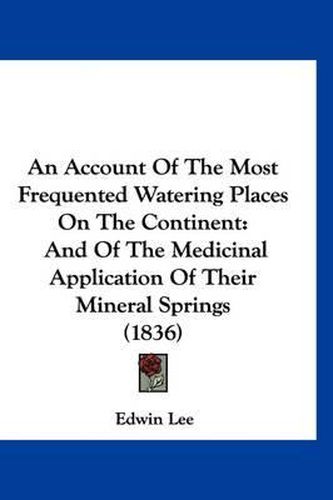Readings Newsletter
Become a Readings Member to make your shopping experience even easier.
Sign in or sign up for free!
You’re not far away from qualifying for FREE standard shipping within Australia
You’ve qualified for FREE standard shipping within Australia
The cart is loading…






Purchase of this book includes free trial access to www.million-books.com where you can read more than a million books for free. This is an OCR edition with typos. Excerpt from book: 79 CHALYBEATE SPRINGS. Many springs containing iron do not belong to the division of chalybeate waters, which comprises only such as by their manifest tonic properties clearly indicate the predominance of the iron over the other mineralising ingredients. This depends not so much upon the quantity of the metal, which is generally very small, as upon the nature, proportion, and state of combination with it of the saline and gaseous elements. These are the chief circumstances modifying the action of chalybeate waters, and enabling persons to employ them with advantage who could not take the pharmaceutical preparations of iron. A course of waters of this class imparts tone to the digestive apparatus, and to the system generally, increasing the muscular power, altering the quality of the blood and of various secretions. It is especially adapted to individuals of torpid and lymphatic temperament, and weakly constitution; to cases of general debility and muscular atony, unattended by morbid alteration of organs or of the fluids, but frequently dependant upon chagrins or other moral causes, ? upon diminution of the quantity, or deterioration of the quality, of the blood, induced by hemorrhage or long-continued discharges, or serious diseases. Chalybeates are also applicable to many cases of impaired energy of the assimilative functions; of hypochondriasis and other disorders of the nervous system; of passive hemorrhage, and catarrhal affections. They are also frequently used as an after-cure, subsequent to the employment of other mineral springs. It is well known, however, that in many cases of debility, though apparently arising from no local disease, the exhibition of tonic remedies, even of the lighter kind, is not well borne, in consequence of the extreme susceptibility of …
$9.00 standard shipping within Australia
FREE standard shipping within Australia for orders over $100.00
Express & International shipping calculated at checkout
Purchase of this book includes free trial access to www.million-books.com where you can read more than a million books for free. This is an OCR edition with typos. Excerpt from book: 79 CHALYBEATE SPRINGS. Many springs containing iron do not belong to the division of chalybeate waters, which comprises only such as by their manifest tonic properties clearly indicate the predominance of the iron over the other mineralising ingredients. This depends not so much upon the quantity of the metal, which is generally very small, as upon the nature, proportion, and state of combination with it of the saline and gaseous elements. These are the chief circumstances modifying the action of chalybeate waters, and enabling persons to employ them with advantage who could not take the pharmaceutical preparations of iron. A course of waters of this class imparts tone to the digestive apparatus, and to the system generally, increasing the muscular power, altering the quality of the blood and of various secretions. It is especially adapted to individuals of torpid and lymphatic temperament, and weakly constitution; to cases of general debility and muscular atony, unattended by morbid alteration of organs or of the fluids, but frequently dependant upon chagrins or other moral causes, ? upon diminution of the quantity, or deterioration of the quality, of the blood, induced by hemorrhage or long-continued discharges, or serious diseases. Chalybeates are also applicable to many cases of impaired energy of the assimilative functions; of hypochondriasis and other disorders of the nervous system; of passive hemorrhage, and catarrhal affections. They are also frequently used as an after-cure, subsequent to the employment of other mineral springs. It is well known, however, that in many cases of debility, though apparently arising from no local disease, the exhibition of tonic remedies, even of the lighter kind, is not well borne, in consequence of the extreme susceptibility of …